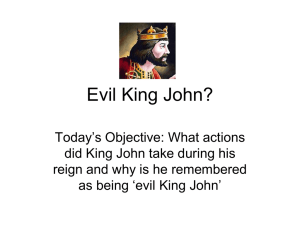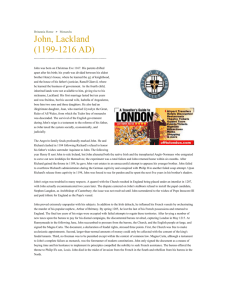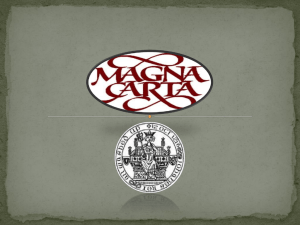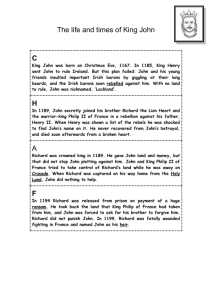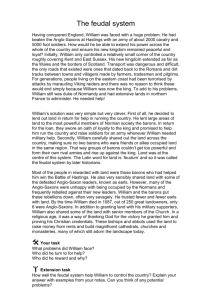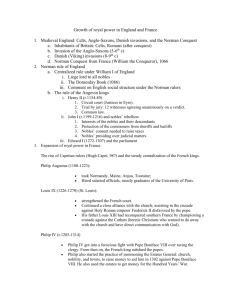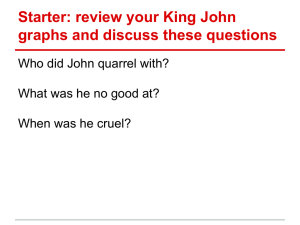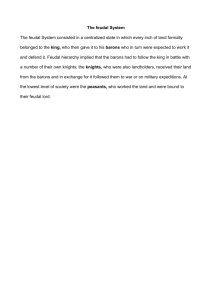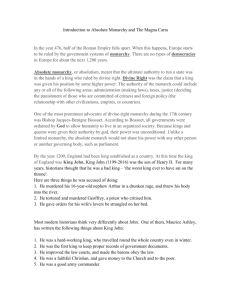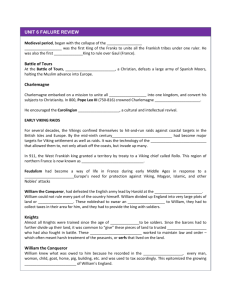Lesson 4 – Good, bad or unlucky TH
advertisement
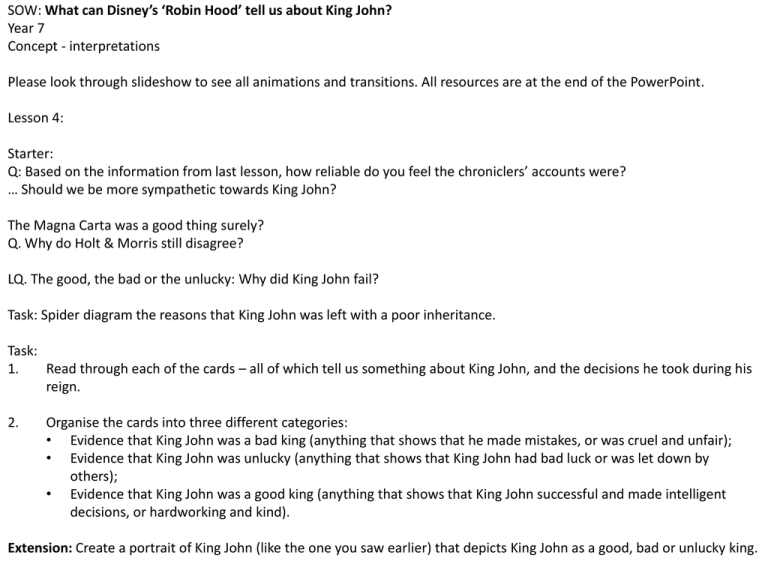
SOW: What can Disney’s ‘Robin Hood’ tell us about King John? Year 7 Concept - interpretations Please look through slideshow to see all animations and transitions. All resources are at the end of the PowerPoint. Lesson 4: Starter: Q: Based on the information from last lesson, how reliable do you feel the chroniclers’ accounts were? … Should we be more sympathetic towards King John? The Magna Carta was a good thing surely? Q. Why do Holt & Morris still disagree? LQ. The good, the bad or the unlucky: Why did King John fail? Task: Spider diagram the reasons that King John was left with a poor inheritance. Task: 1. Read through each of the cards – all of which tell us something about King John, and the decisions he took during his reign. 2. Organise the cards into three different categories: • Evidence that King John was a bad king (anything that shows that he made mistakes, or was cruel and unfair); • Evidence that King John was unlucky (anything that shows that King John had bad luck or was let down by others); • Evidence that King John was a good king (anything that shows that King John successful and made intelligent decisions, or hardworking and kind). Extension: Create a portrait of King John (like the one you saw earlier) that depicts King John as a good, bad or unlucky king. EQ: What can Disney’s ‘Robin Hood’ tell us about King John? Let’s think back to last lesson. With the person sitting next to you, try to recall AS MANY reasons from the chronicler’s backgrounds that suggest we need to be cautious about trusting them too much. So, how reliable do you think the chroniclers’ interpretations of John were? So, perhaps John wasn’t so bad after all… I told you I was a good king! In fact, John was responsible I always believed for one of the most important in you! documents in England’s history; the Magna Carta (you know, that thing that they have been talking about on the telly all week). Clause 1: “The English Church shall be free. The King must not interfere with the Church.” Clause 8: “No widow shall be forced to marry as long as she wishes to live without a husband.” Clause 39: “No freeman should be arrested, imprisoned, or in any way destroyed without a fair trial.” This is one of the original Good, right?Magna Cartas. What is this outpouring of sympathy for King John?! I need to go away and write a strongly-worded article… So why do Messers Holt & That ought to do it! Morris still disagree? So, was he bad or was he good?... Or, was he unlucky? “John had the administrative ability of a great ruler but he never got the chance to prove his skills. From the moment he began his rule, rivals and traitors tried to cheat him out of his inheritance.” – W. Warren “John had the administrative ability of a great ruler but he never got the chance to prove his skills. From the moment he began his rule, rivals and traitors tried to cheat him out of his inheritance.” – W. Warren This quote came from the Oxford-educated medieval historian Wilfred Lewis Warren in his book King John, which was published in 1961. Like J. C. Holt, Warren So why does Warren feel that King wrote most of his work during the 1960s. An expert was unlucky? on AngevinJohn England, Warren went on to become professor of history and Dean of theology at Queen’s University, Belfast, before his death in 1994. Several historians (including Warren) You may want to have argued that– jot these down Kingcould John even was you unlucky, and that label each areahe inherited poor on a spider relationships and diagram in your situations from book, like thehis father (Henry II) and one below. brother (Richard I). There are three key areasJohn’s historians poorsuch as Warren point to inheritance with regards to John’s misfortune. 1. The Church The Roman Catholic Church was run by the Pope who lived in Rome – the clergy (religious persons, such as monks) obeyed the Pope rather than the King. English Kings did not like the Pope interfering with their affairs – and therefore tried to limit their powers. Henry II appointed his close friend Thomas Becket to the position of Archbishop of Canterbury in order to reduce some of these powers – however the relationship soon turned sour and Henry had Thomas murdered (by accident). This damaged the relationship between the Church in England and the King. Also, just before John came to the throne, a new Pope was elected. He was far more ambitious than previous Popes. 2. The Barons The Barons were the most powerful and wealthy group of people in the country. They helped supply the king with an army at wartime, and maintain law and order during peacetime. It was important to keep them on-side. Henry II angered many barons when he destroyed more than 300 of their castles, in areas which he felt could threaten him. He also removed their powers in the local courts by employing recently-formed judges. Some leading barons, such as the influential Roger Bigod, rebelled. Richard also upset the barons by charging them high taxes for his crusades abroad, and insisted on more money to pay his ransom when he was captured. Many barons were angry at the way in which the Angevin Empire was being ruled. 3. Threats from abroad The Angevin Empire included large parts of France. King Philip II of France wanted to win those parts back, and had been stirring up rebellions in order to weaken England’s control over the land. Travel during these times was very slow, and thus having control over a large empire was difficult. Richard was initially close with Philip, with the pair setting off on Crusade with each other. However, they soon fell out after Richard refused to marry Philip’s sister. Philip angrily returned to France and invaded Richard’s lands in Normandy. He also encouraged John to stir up trouble in England. Richard held onto his land in France, but he was undoubtedly a strong fighter – a lesser soldier would find the task a great deal more daunting. So, what ‘sort of’ king was King John: good, bad or unlucky?... This leads on to today’s question… The good, the bad or the unlucky: What ‘sort of’ king was John? Which ‘sort of’ king was King John? Your task is to analyse the evidence cards and come to a conclusion on which sort of king King John was: good, bad or unlucky. • Was he, as Morris (left) claims, ‘a villain’? • Was he, as Warren (centre) claimed, ‘never [given] the chance to prove his skills’? • Or, was he, as Holt (right) claimed, ‘a standard of success never equalled in the medieval period’? 1. Organise the cards into the correct category. 1) Organise the cards into categories. Bad Unlucky Good Your task is to: 1. Read through each of the cards – all of which tell us something about King John, and the decisions he took during his reign. 2. In pairs, organise the cards into three different categories: • Evidence that King John was a bad king (anything that shows that he made mistakes, or was cruel and unfair); • Evidence that King John was unlucky (anything that shows that King John had bad luck or was let down by others); • Evidence that King John was a good king (anything that shows that King John successful and made intelligent decisions, or hardworking and kind). Extension: Choose 1 from each category, and explain to your partner why this piece of evidence proves that King John was good / bad / unlucky. So: good, bad or unlucky? What sort of king was King John? In your books write: Based on the evidence that I have collected, I mostly agree with the historian (1. M. Morris / 2. W. Warren / 3. J. Holt) that King John was a (1. bad / 2. unlucky / 3. good) king. I have come to this conclusion because… (example) • However, King John was also (bad / unlucky / good) when (example)… because… • He was also occasionally (bad / unlucky/ good) when (example)… because… Extension: Create a portrait of King John (like the one you saw earlier) that depicts King John as a good, bad or unlucky king. HINT: You can all see a copy of me on the sheet you got in Lesson 3. Extension: This is the original portrait painted by Matthew Paris. However, we have already established that we cannot trust everything the chroniclers said about John. How will you draw John? Worse? Better? Unlucky? Think about: • How is crown is worn – or if he has a crown. • Does he have a sword – is it a sign of strength or hate? • What else will you need? Resources John was very interested in the royal court. He often sat as judge and decided cases himself. John also travelled around the whole country. He knew England better than previous kings and was hard-working. John increased the strength of his navy. Richard I had built up a navy and given it a base at Portsmouth, but many of his ships had been destroyed in the wars against France. John built new ships, strengthened Portsmouth’s defence, and established a new port at Liverpool. On feast days John often made arrangements to feed hundreds of paupers (peasants). In 1209, 100 paupers were fed in Newcastle. Other kings had done this, but few were as generous as John. Sometimes he would provide meals for as many as 1000 paupers at one sitting. John carried a small library with him wherever he went. Books were very rare in his time. In 1205, he asked Reginald of Cornhill to send him a history of England, such was his interest in learning. A new Pope had been elected in 1198, just before John became king. The new Pope was determined to increase his power. He was a tougher opponent than earlier Popes. John chose the new Archbishop of Canterbury because it showed that the king, not the Pope, had the most power in England. England was Catholic at the time and the English clergy (religious persons, such as monks) were loyal to the Pope. They found this move deeply offensive. At the time the clergy were a very wealthy group, with power and influence. In revenge the Pope passed an interdict (ban on religious ceremonies) on the whole of England and Wales. In an act of fury John decided to punish the Church by taking much of its land and property. He then used this land to finance his wars. Many members of the Church never forgave John. In 1213 John made peace with the Pope. By making peace, John gained the Pope as a powerful ally. The Pope supported John against the Philip II of France, and the barons, and he later said that John did not have to keep Magna Carta. Although Richard I named John as his heir, John had a rival. His nephew, Arthur of Brittany, thought that he should be king and he was supported by Philip II, the King of France. John had to fight for his crown – and he won! Moving quickly, his army beat both Philip and Arthur. John’s reign had got off to an excellent start. Peace did not last long. In 1200, John made a mistake. He left his first wife to marry Isabella of Angoulême. Isabella had been about to marry Hugh of Lusignan. Hugh was outraged. He claimed that John had stolen his bride and complained to Philip II. This was the chance Philip II had been waiting for. Philip, Hugh and Arthur joined forces and attacked John’s land in France. In 1203 rumours spread that John had murdered Arthur. This caused a rebellion (riot) in Brittany and other parts of his empire. Powerful French barons deserted John, and began to support Philip. This made it almost impossible for John to stop Philip taking his land in France. John lost Normandy in 1204. After that it was one disaster after another, and Philip’s army captured the rest of John’s land in France. John was soon planning to win back his empire. He skilfully captured Gascony, but when he attacked Anjou his barons let him down again. Many of them had abandoned him – some of them without putting up any fight whatsoever. Without the barons’ men, John had to agree to a truce (peace treaty). John had failed to win back his land in France. In 1205 some barons refused to help John regain his land in France. John abandoned his plans to invade France, but demanded taxes from the barons anyway. This angered the barons because they usually only paid taxes in wartime. The barons were, at the time, the most powerful and wealthy group of people in the country. Many of them never forgave John for this. In 1214 John demanded even more taxes from the barons even though his armies had been beaten in France. There was a lot of protest. After John’s failure in France some barons were willing to risk rebellion. In January 1215 the barons demanded that John change the way that he ran the country. John put off making any decisions until April. When April came, and the barons arrived for their meeting, John failed to turn up. He had no intention of giving up any of his rights. In June 1215, John finally realised that he could not beat the rebel barons. He met them at Runnymede, near Windsor Castle, and agreed to change the way he ran the country. However, John did not agree wilfully – he was forced to, such was his stubbornness. The agreement was written down in the Magna Carta (the Great Charter).
